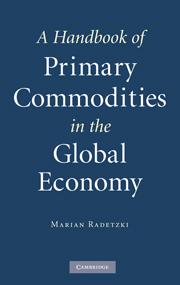Book contents
- Frontmatter
- Contents
- List of figures
- List of tables
- Acknowledgments
- Introduction
- 1 The historical framework
- 2 The geography of commodity production and trade
- 3 Comparative advantage and the trade policy distortions
- 4 Price formation and price trends in commodities
- 5 The commodity exchanges, commodity investments, and speculation
- 6 The economics of exhaustible resource depletion
- 7 Fears of, and measures to assure, supply security
- 8 Producer cartels in international commodity markets
- 9 Public ownership in primary commodity production
- 10 The monoeconomies: issues raised by heavy dependence on commodity production and exports
- References
- Index
7 - Fears of, and measures to assure, supply security
Published online by Cambridge University Press: 23 June 2009
- Frontmatter
- Contents
- List of figures
- List of tables
- Acknowledgments
- Introduction
- 1 The historical framework
- 2 The geography of commodity production and trade
- 3 Comparative advantage and the trade policy distortions
- 4 Price formation and price trends in commodities
- 5 The commodity exchanges, commodity investments, and speculation
- 6 The economics of exhaustible resource depletion
- 7 Fears of, and measures to assure, supply security
- 8 Producer cartels in international commodity markets
- 9 Public ownership in primary commodity production
- 10 The monoeconomies: issues raised by heavy dependence on commodity production and exports
- References
- Index
Summary
The discussions in chapter 2 demonstrated how, in the course of the twentieth century, Japan, the United States, and Western Europe, the world's industrial centers, have become increasingly dependent on imported commodity supply. Expanded needs due to industrialization and income growth, a relative depletion of the domestic resource base, and the secular decline in transport costs, explain why it had become increasingly economical for the advanced nations to replace the domestic production of a multitude of raw materials by imported supply. Primarily on account of differences in resource endowments, the dependence on imported primary commodities is most pronounced in Japan and least in the United States, with Western Europe in between.
The apparent indispensability of many commodities, and the threat of international supply disruptions through wars and other disorders, has for long caused concern to the importing nations. Influenced by the autarkic tendencies that evolved during the Great Depression, even Keynes (1933) deviated from the gospel of comparative advantage. He expressed the view that the leading economies' reliance on far-away sources of raw materials supply had become excessive, so a greater self-sufficiency might be warranted on both political and economic grounds, even when local production costs more than imports. In more recent times, the major industrialized countries have launched a variety of actions to overcome the perceived problems of commodity imports insecurity. I say perceived, because the greater risks of relying on imported supply, as distinct from domestic supply, are not uniformly borne out by historical evidence.
- Type
- Chapter
- Information
- A Handbook of Primary Commodities in the Global Economy , pp. 126 - 143Publisher: Cambridge University PressPrint publication year: 2008



